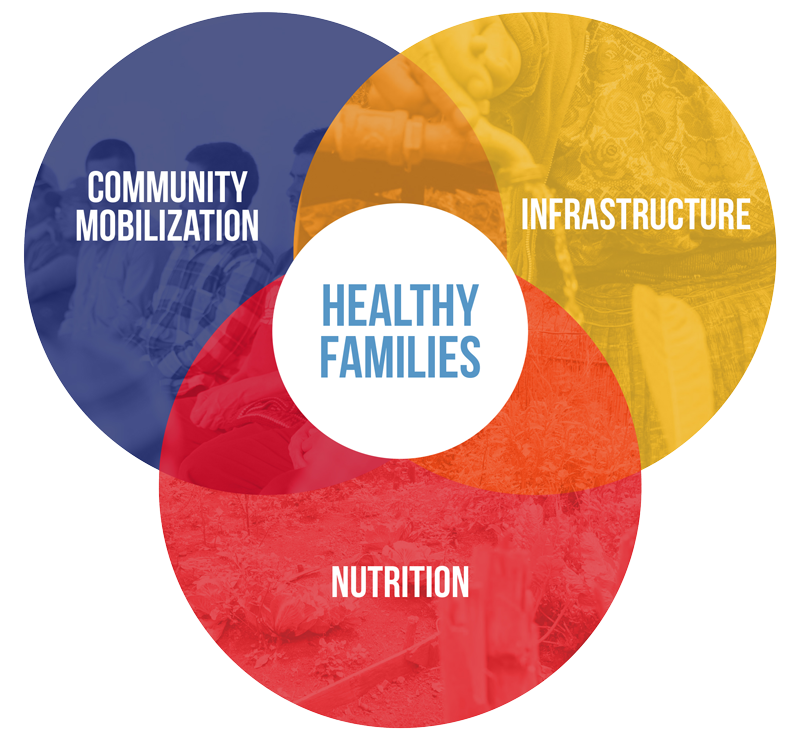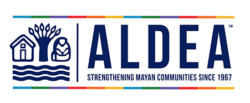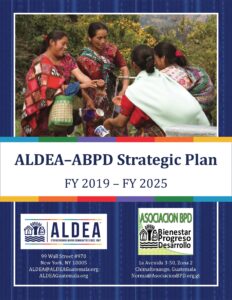Nutrition
Increase nutritional status of children through better feeding practices, a healthier family diet, and improved family planning.
 To most effectively address chronic childhood malnutrition, our program interventions focus on the right nutrition for mothers and children in the “first 1,000 days” (beginning with conception through the child’s second birthday). In these crucial days, the body is quickly laying down its fundamental building blocks for brain development and future growth. Any disturbance leaves a long-lasting mark: damage from undernutrition in early life is largely irreversible.
To most effectively address chronic childhood malnutrition, our program interventions focus on the right nutrition for mothers and children in the “first 1,000 days” (beginning with conception through the child’s second birthday). In these crucial days, the body is quickly laying down its fundamental building blocks for brain development and future growth. Any disturbance leaves a long-lasting mark: damage from undernutrition in early life is largely irreversible.
We apply our participatory community education and capacity-building model to nutrition education that addresses nutrition during pregnancy, exclusive breastfeeding for the first six months and continued breastfeeding for 24 months, gradual introduction of complementary foods after six months of age, demonstrations on how to use locally available food to prepare nutritious meals, and hygienic food handling. Nutritious snacks are also provided at all community activities. ABPD trains local youth to take care of children using early childhood stimulation techniques while their mothers are being trained on nutrition.
Access to healthy foods is a key component to nutrition, and we address this through sustainable agriculture programs that help increase food security. ABPD works to improve the production of local staple foods like corn and beans through the use of more sustainable fertilizing techniques, improving soil quality and preservation, reducing post-harvest losses, and using seeds that are less susceptible to the effects of climate.
 Dairy goats are an important component of our efforts to defeat chronic malnutrition and address the impact of climate change. They are a resilient source of nutrients that are not affected by tropical storms. Goat milk is an excellent source of calcium and vital minerals for children suffering from malnutrition. They are easy to sustain, can eat almost anything, and their manure serves as healthy compost for family gardens. Goats adapt to the rocky highlands of Guatemala better than cows do, require less food, and consume less water. Importantly, the pesky problem of lactose intolerance doesn’t occur with goat milk. Our goat project is simple and sustainable: families who have children under five that are malnourished receive a milking goat. The family commits to giving the first female offspring of that goat to another family until all children in the community have access to goat milk.
Dairy goats are an important component of our efforts to defeat chronic malnutrition and address the impact of climate change. They are a resilient source of nutrients that are not affected by tropical storms. Goat milk is an excellent source of calcium and vital minerals for children suffering from malnutrition. They are easy to sustain, can eat almost anything, and their manure serves as healthy compost for family gardens. Goats adapt to the rocky highlands of Guatemala better than cows do, require less food, and consume less water. Importantly, the pesky problem of lactose intolerance doesn’t occur with goat milk. Our goat project is simple and sustainable: families who have children under five that are malnourished receive a milking goat. The family commits to giving the first female offspring of that goat to another family until all children in the community have access to goat milk.
Based on feedback from program participants, in 2022 we diversified our sustainable agriculture offerings to include laying hens and rabbits in addition to dairy goats to increase families’ access to protein in their diets. Both laying hens and rabbits are inexpensive, sustainable, easy to maintain alternatives for families that prefer to increase their protein intake from sources other than goat milk.
Family gardens also help  ensure a low-cost and easily available source of vitamins through small-scale production of fruits and vegetables. We promote sustainable farming techniques that can be implemented using locally available resources. ABPD provides an initial donation of seeds to help families start their gardens and families gradually contribute more of their own funds to purchase future seeds. Many families are able to produce sufficient amounts of food that they can sell extra produce to generate the income necessary to re-invest in seeds, fertilizers, and insecticides.
ensure a low-cost and easily available source of vitamins through small-scale production of fruits and vegetables. We promote sustainable farming techniques that can be implemented using locally available resources. ABPD provides an initial donation of seeds to help families start their gardens and families gradually contribute more of their own funds to purchase future seeds. Many families are able to produce sufficient amounts of food that they can sell extra produce to generate the income necessary to re-invest in seeds, fertilizers, and insecticides.
To ensure adequate nutrition for their family, parents must be able to determine the number and spacing of their children. High birth rates contribute to large total family size and closely spaced births, and are an indirect contributor to chronic malnutrition. The family planning component of the program is integrated into all of our training activities. Nearly one third of married, indigenous women of reproductive age have a self-reported, unmet need for contraception. ABPD provides individual family planning counseling and makes a variety of contraceptive methods available to program participants.


 Successful and sustainable development projects require the active participation of the entire community. Our programs are designed to engage everyone, especially women and youth, whose voices are typically marginalized within families and communities. We use a capacity-building methodology to analyze community needs and define the local activities and partners to solve the problems. Graphics for non-literate community members are used to stimulate thinking, engage people’s creative abilities, and develop solutions they can apply to their everyday living – both in their individual families and collectively in their communities.
Successful and sustainable development projects require the active participation of the entire community. Our programs are designed to engage everyone, especially women and youth, whose voices are typically marginalized within families and communities. We use a capacity-building methodology to analyze community needs and define the local activities and partners to solve the problems. Graphics for non-literate community members are used to stimulate thinking, engage people’s creative abilities, and develop solutions they can apply to their everyday living – both in their individual families and collectively in their communities. Promotors receive specific training from our staff during the first year. During the second year, ABPD will continue to guide these emerging leaders until they are ready to take the reins of the program, solving issues and motivating people without the need for external support. As we conclude our intervention after three years, we usually see a substantial increase in women’s participation in community communities and other decision-making roles.
Promotors receive specific training from our staff during the first year. During the second year, ABPD will continue to guide these emerging leaders until they are ready to take the reins of the program, solving issues and motivating people without the need for external support. As we conclude our intervention after three years, we usually see a substantial increase in women’s participation in community communities and other decision-making roles. We have learned that in order to truly support the empowerment of women and youth, we must fully engage men in our community mobilization programs as well. In 2019 we developed a New Masculinities program based on feedback from women in our empowerment programs. Through these trainings, men learn to respect the rights of women and youth, how to support improvements in their families’ health, and how to be inclusive leaders. They also choose a practical training topic, such as masonry or electricity, that builds their skills to help improve their community.
We have learned that in order to truly support the empowerment of women and youth, we must fully engage men in our community mobilization programs as well. In 2019 we developed a New Masculinities program based on feedback from women in our empowerment programs. Through these trainings, men learn to respect the rights of women and youth, how to support improvements in their families’ health, and how to be inclusive leaders. They also choose a practical training topic, such as masonry or electricity, that builds their skills to help improve their community. A healthy home environment plays a critical role in a family’s nutrition and overall health. In the rural areas where ALDEA works, women and often children often have to spend several hours of each day carrying water from springs or rivers, and in most cases the water they have access to is not suitable for drinking. Many families must cook over an open fire, and the indoor smoke causes respiratory and other illnesses. Without proper sanitation facilities, homes and yards where children play are contaminated with household waste. All of these factors lead to gastrointestinal and other diseases that inhibit the body’s ability to absorb nutrients.
A healthy home environment plays a critical role in a family’s nutrition and overall health. In the rural areas where ALDEA works, women and often children often have to spend several hours of each day carrying water from springs or rivers, and in most cases the water they have access to is not suitable for drinking. Many families must cook over an open fire, and the indoor smoke causes respiratory and other illnesses. Without proper sanitation facilities, homes and yards where children play are contaminated with household waste. All of these factors lead to gastrointestinal and other diseases that inhibit the body’s ability to absorb nutrients. necessary technical consultants and monitoring support for the water system. Community members provide basic coordination and oversight, manual labor, locally available building materials, and the full cost of hiring masons for the construction of stoves, latrines, and gray water filters. ABPD supervises the projects, provides most of the materials that are not locally available, and supports and mentors the local committee to coordinate the whole process.
necessary technical consultants and monitoring support for the water system. Community members provide basic coordination and oversight, manual labor, locally available building materials, and the full cost of hiring masons for the construction of stoves, latrines, and gray water filters. ABPD supervises the projects, provides most of the materials that are not locally available, and supports and mentors the local committee to coordinate the whole process. Even as we work to adapt to the increase in tropical storms, drought, and other disastrous weather patterns, we have to be prepared to step in when prevention methods fail. Understanding this, ABPD will continue to provide an emergency response when necessary. Such responses include distributing relief supplies and rebuilding damaged water systems, latrines, schools, and other small infrastructure in communities that suffer disasters.
Even as we work to adapt to the increase in tropical storms, drought, and other disastrous weather patterns, we have to be prepared to step in when prevention methods fail. Understanding this, ABPD will continue to provide an emergency response when necessary. Such responses include distributing relief supplies and rebuilding damaged water systems, latrines, schools, and other small infrastructure in communities that suffer disasters. To most effectively address chronic childhood malnutrition, our program interventions focus on the right nutrition for mothers and children in the “first 1,000 days” (beginning with conception through the child’s second birthday). In these crucial days, the body is quickly laying down its fundamental building blocks for brain development and future growth. Any disturbance leaves a long-lasting mark: damage from undernutrition in early life is largely irreversible.
To most effectively address chronic childhood malnutrition, our program interventions focus on the right nutrition for mothers and children in the “first 1,000 days” (beginning with conception through the child’s second birthday). In these crucial days, the body is quickly laying down its fundamental building blocks for brain development and future growth. Any disturbance leaves a long-lasting mark: damage from undernutrition in early life is largely irreversible. Dairy goats are an important component of our efforts to defeat chronic malnutrition and address the impact of climate change. They are a resilient source of nutrients that are not affected by tropical storms. Goat milk is an excellent source of calcium and vital minerals for children suffering from malnutrition. They are easy to sustain, can eat almost anything, and their manure serves as healthy compost for family gardens. Goats adapt to the rocky highlands of Guatemala better than cows do, require less food, and consume less water. Importantly, the pesky problem of lactose intolerance doesn’t occur with goat milk. Our goat project is simple and sustainable: families who have children under five that are malnourished receive a milking goat. The family commits to giving the first female offspring of that goat to another family until all children in the community have access to goat milk.
Dairy goats are an important component of our efforts to defeat chronic malnutrition and address the impact of climate change. They are a resilient source of nutrients that are not affected by tropical storms. Goat milk is an excellent source of calcium and vital minerals for children suffering from malnutrition. They are easy to sustain, can eat almost anything, and their manure serves as healthy compost for family gardens. Goats adapt to the rocky highlands of Guatemala better than cows do, require less food, and consume less water. Importantly, the pesky problem of lactose intolerance doesn’t occur with goat milk. Our goat project is simple and sustainable: families who have children under five that are malnourished receive a milking goat. The family commits to giving the first female offspring of that goat to another family until all children in the community have access to goat milk.  ensure a low-cost and easily available source of vitamins through small-scale production of fruits and vegetables. We promote sustainable farming techniques that can be implemented using locally available resources. ABPD provides an initial donation of seeds to help families start their gardens and families gradually contribute more of their own funds to purchase future seeds. Many families are able to produce sufficient amounts of food that they can sell extra produce to generate the income necessary to re-invest in seeds, fertilizers, and insecticides.
ensure a low-cost and easily available source of vitamins through small-scale production of fruits and vegetables. We promote sustainable farming techniques that can be implemented using locally available resources. ABPD provides an initial donation of seeds to help families start their gardens and families gradually contribute more of their own funds to purchase future seeds. Many families are able to produce sufficient amounts of food that they can sell extra produce to generate the income necessary to re-invest in seeds, fertilizers, and insecticides.